

The San Mateo Union High School District has a system of tardiness policies to discourage lateness. Consequences for a student having 10 or more unexcused tardies during a semester include detention, a letter to parents and the possible loss of extracurricular activities for the semester. Despite this, students often arrive late to class.
“In my 12 years here at Aragon, tardiness has consistently been a problem,” said Spanish 4 and Advanced Placement Spanish teacher Ben Ho. “In the [other] schools that I’ve taught in, I don’t think tardiness is as big of a problem as it is here.”
Some teachers follow the district, which states that a student is tardy “if they are not in their classroom seat when the last bell rings or if they arrive late without a pass,” more strictly.
“Any moment after the bell is rung, the students are considered late,” Ho said. “What I started to do this year was when the bell rang, I actually [closed] the door. Basically if [the student has] to open the door, they’re late.”
Unlike Ho, many teachers are more lenient with their tardy policies and let students come to class late with little, if any, reprimand.
“From my experience, [some teachers] just pull you aside and say ‘Hey, can you be on time?’” said sophomore Juliya Soultanova.
Some students are late to class because of traffic or issues at home outside of their control.
“In my 12 years here at Aragon, tardiness has consistently been a problem”
“Most of the time it’s not actually the kid’s fault,” said sophomore Audrey Yanez. “Sometimes there’s more traffic, [or] sometimes their alarms don’t work.”
Other students, however, purposefully come late to class or have a problem with time management.
“At brunch and lunchtime, kids are busy in conversation with friends,” said Dean of Students Donna Krause. “And when the bell rings, they think they have more time than they actually do. And so they will keep talking to their friends.”
One of the reasons teachers may be concerned about tardiness is it may disrupt the class.
“There’s also an effect that tardiness [has] on a class,” Ho said. “As a member of the learning community, students should recognize that their actions will affect them in the class.”
Tardiness can have negative effects on the teacher as well. Important material can be missed, and teachers would have to take out the time to reteach the missed material.
“It’s very disrespectful [to the teachers] for kids to be late,” Krause said.
A study conducted by the U.S. Department of Education shows that students who are regularly tardy have lower GPAs, lower graduation rates and lower scores on standardized tests.
“My priority is to help prepare students for life after high school,” Ho said. “Punctuality is one of the highest qualities that employers are looking for in future employees.”
“Punctuality is one of the highest qualities that employers are looking for in future employees”
One aspect of tardiness that can often be overlooked is the mental and emotional side for students.
“I had a breakdown the night before so I came to school late,” Yanez said. “I went the same route I always did but because of the night before I took a little time off [in] the morning. I went to class and [my teacher] got mad at me.”
These circumstances can put the student in an unpleasant situation.
“I am more concerned right now with the social-emotional aspects of what is going on with students,” Krause said. “There are reasons [for] kids being depressed [and] kids not wanting to come to school. Those are the things that I try to talk with the students about. I go to the underlying cause of why they are tardy.”
After seeing the dean, some students are sent to the counselors so the underlying reasons can be worked on to minimize the cases of tardiness.
“Pretty much everything has changed [after COVID-19],” Krause said. “In terms of tardiness, I see more kids coming later. COVID really did a number [of things to] these kids.”
Regardless of the reasons for tardiness, students should make an effort to come to school on time. This foster good habits and can greatly benefit students later in life.
Written by Ellen Li



